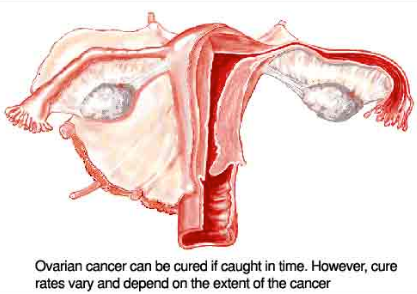Ovarian Tumor Removal in Czech Republic
Search and Compare the Best Clinics and Doctors at the Lowest Prices for Ovarian Tumor Removal in Czech Republic

Find the best clinics for Ovarian Tumor Removal in Czech Republic
No pricing info available
Ukraine offers the best prices Worldwide
Price: $ 714
From 47 verified reviews
Miloslav Cerny, 20 September 2020
Stada dobra Bulovka... kdo tam nebyl o hodne prisel.
- Home
- Czech Republic
WHY US?
At Medijump, we're making medical easy. You can search, compare, discuss, and book your medical all in one place. We open the door to the best medical providers worldwide, saving you time and energy along the way, and it's all for FREE, no hidden fees, and no price markups guaranteed. So what are you waiting for?

Free

Best Price

Widest Selection

Risk-Free
What you need to know about Ovarian Tumor Removal in Czech Republic

Ovarian tumors are usually benign (non-cancerous), but if left untreated they may develop into Ovarian Cancer. If you have an ovarian tumor that grows and causes painful symptoms, you may need to undergo ovarian tumor removal, which is a surgical procedure to remove the tumor and sometimes the affected ovary or the surrounding tissue as well.
What does a Ovarian Tumor Removal Procedure Involve?
Ovarian tumor removal can be carried out with laparoscopy or laparotomy depending on the size of the tumor, both are done under general anesthetic. Your surgeon may only remove the tumor and leave the rest of the ovary intact or remove the entire ovary and fallopian tube. If the tumor is malignant (cancerous), your surgeon may remove part or all of the abnormal growth (ovarian tumor debulking).
How Long Should I Stay in Czech Republic for a Ovarian Tumor Removal Procedure?
You will need to stay in the hospital for 3 to 7 days after the surgery, but you should plan to stay in Czech Republic for 14 days. During your stay, you will attend follow-up hospital checkups where your surgeon monitors your condition and your surgeon will also remove the stitches.
What's the Recovery Time for Ovarian Tumor Removal Procedures in Czech Republic?
You may be able to go back to work within 4 weeks, but it is advisable to wait around 6 weeks to get back to your normal activities. During your recovery period, avoid intense exercises, heavy lifting, and sexual intercourse.
What sort of Aftercare is Required for Ovarian Tumor Removal Procedures in Czech Republic?
After the surgery, your surgeon will give you instructions regarding your diet, exercise, and wound care. You may need to meet your local doctor regularly so they can make sure your tumor and/or cancer has not come back. It is also advisable to see a therapist or counselor to talk to about emotional changes that ovarian tumor removal can cause.
What's the Success Rate of Ovarian Tumor Removal Procedures in Czech Republic?
Ovarian tumor removal has a high success rate of about 90%. However, just like any surgery, there are always side effects and risks that come with this type of surgery, including infection, bleeding and damage to nearby organs (such as the ureters and bladder). If both of your ovaries are removed, the side effect is menopause, infertility, dry vagina, hot flashes, night sweats, fatigue, and mood shifts.
Are there Alternatives to Ovarian Tumor Removal Procedures in Czech Republic?
In some cases, if your tumor is benign, you may need no treatment. Instead, your doctor may use “watchful waiting” to ensure the tumor does not cause any problems. If your tumor is malignant, your alternative is systemic therapies, such as hormone therapy, chemotherapy, and targeted therapy.
What Should You Expect Before and After the Procedure
Ovarian tumors can cause painful symptoms and cancerous. After ovarian tumor removal, you should not feel any of these symptoms anymore and you no longer will have a tumor in your ovary. Also, the chance of cancer spreading to other parts of your body is reduced and your fertility is usually preserved after treatment.
Whilst the information presented here has been accurately sourced and verified by a medical professional for its accuracy, it is still advised to consult with your doctor before pursuing a medical treatment at one of the listed medical providers
No Time?
Tell us what you're looking for and we'll reachout to the top clinics all at once
Enquire Now

Popular Procedures in Czech Republic
Prices Start From $260

Prices Start From $714

Prices Start From $714

Recommended Medical Centers in Czech Republic for Ovarian Tumor Removal

- Interpreter services
- Translation service
- Religious facilities
- Medical records transfer
- Medical travel insurance
- Health insurance coordination
- TV in the room
- Safe in the room
- Phone in the room
- Private rooms for patients available

- Interpreter services
- Translation service
- Religious facilities
- Medical records transfer
- Medical travel insurance
- Health insurance coordination
- TV in the room
- Safe in the room
- Phone in the room
- Private rooms for patients available

- Interpreter services
- Translation service
- Religious facilities
- Medical records transfer
- Medical travel insurance
- Health insurance coordination
- TV in the room
- Safe in the room
- Phone in the room
- Private rooms for patients available

- Interpreter services
- Translation service
- Religious facilities
- Medical records transfer
- Medical travel insurance
- Health insurance coordination
- TV in the room
- Safe in the room
- Phone in the room
- Private rooms for patients available

- Interpreter services
- Translation service
- Religious facilities
- Medical records transfer
- Medical travel insurance
- Health insurance coordination
- TV in the room
- Safe in the room
- Phone in the room
- Private rooms for patients available

- Interpreter services
- Translation service
- Religious facilities
- Medical records transfer
- Medical travel insurance
- Health insurance coordination
- TV in the room
- Safe in the room
- Phone in the room
- Private rooms for patients available
Ovarian Tumor Removal in and around Czech Republic
The Czech Republic is a landlocked country in Central Europe and it has a rich and eventful history, as well as amazing attractions. From medieval towns and magnificent castles to picturesque national parks and relaxing spa resorts, it has a lot to offer. The country also boasts top-quality healthcare and is emerging as a popular medical tourism destination. Medical procedures in the country are performed with the latest technology and techniques. The medical professionals are highly qualified, well trained, and internationally recognized. Besides, the cost of medical procedures in the country is extremely competitive. Medical tourists can make significant savings compared to most other countries in Europe. Cosmetic surgery is particularly popular among international medical tourists.
Popular Parts of Czech Republic
Prague is the capital and is popular for its fine dining, eccentric nightlife, and wonderfully preserved medieval buildings with Gothic architecture, such as Prague Castle, the 14th-century Charles Bridge, and the Astronomical Clock. Along with Prague, Ceský Krumlov and Brno are frequently visited by tourists as well.
Weather and Climate in the Czech Republic
Due to its location, the Czech Republic has a mostly temperate climate. Extreme weather is rare, but the summers can get hot and the winters cold. Summer starts in June and the days can be scorching hot. The average temperature is around 26°C, but in recent years, it tends to rise to 37°C. Winter, from November to March, can get rather cold. The average temperatures drop to around 2°C during the day and -2°C at night, with some snowfall and rain. Spring (March-May) and autumn (September – October) have beautiful weather.
Getting around in the Czech Republic
Václav Havel Airport Prague is the main airport where international visitors fly into and out of the Czech Republic. It serves numerous flights to many cities around Europe and Asia, including London, Moscow, Dubai, and Seoul. The Czech Republic has an affordable and reliable public transport system. Domestic flights are available, but rarely necessary. The rail network is affordable and very comprehensive, covering almost every city and town in the county. The bus also has extensive coverage throughout the country. Public transport within cities is also excellent. In major cities, you can opt for the metro, tram, bus, or trolleybuses. Taxis are widely available and are metered, but the fares are higher at night.
Tourist Visas in the Czech Republic
Nationals of all EU countries do not need a visa to visit and stay in the Czech Republic. The country is a part of the Schengen area, which means citizens of around 62 countries can stay for up to 90 days without a visa. These visa-exempt countries include Australia, Canada, the US, and South Korea. Citizens of other countries are required to apply for a visa before visiting the country. Those who want to receive medical care should obtain a Czech Republic Visa for Medical Purposes.
Additional Information
- Local Currency: Czech Koruna/Czech Crown (CZK) is the currency of the Czech Republic. 1 USD is equivalent to 22.98 CZK. Note that the euro is not widely accepted in the country.
- Money & Payments: ATMs are widespread around the Czech Republic. Major credit cards, such as MasterCard and Visa, are accepted for many types of transactions, but you may need to pay in cash for smaller amounts. Tipping is expected, especially in restaurants. Tip at least 10% of the bill.
- Local Language: The official and most commonly spoken language is Czech, but Slovak is widely spoken as well. Many people, particularly in major cities, can speak English and German.
- Local Culture and Religion: Most of the population is religiously unaffiliated and does not believe in God. However, Christianity is the largest religion. Judaism, Islam, Buddhism, and Paganism are also practiced by a small percentage of the population.
- Public holidays: New Year’s Day, Easter Monday, Liberation Day, Sts Cyril & Methodius Day, Jan Hus Day, Republic Day, and Czech Statehood Day are some of the most important public holidays in the Czech Republic.
Popular Searches
- Plastic Surgery in Thailand
- Dental Implants in Thailand
- Hair Transplant in Thailand
- Breast Augmentation Thailand
- Gastric Sleeve in Thailand
- Gender Reassignment Surgery in Thailand
- Laser Hair Removal in Bangkok
- Botox in Bangkok
- Dermatology in Bangkok
- Breast Augmentation in Bangkok
- Coolsculpting in Bangkok
- Veneers in Turkey
- Hair Transplant in Turkey
- Rhinoplasty in Turkey
- Stem Cell Therapy in Mexico
- Rhinoplasty in Mexico
- Liposuction in Mexico
- Coolsculpting in Tijuana
- Rhinoplasty in Korea
- Scar Removal in Korea
- Gastric Sleeve in Turkey
- Bone Marrow Transplant in India
- Invisalign in Malaysia
- Plastic Surgery in the Dominican Republic
- Tummy Tuck in the Dominican Republic
- Plastic and Cosmetic Surgery in Poland
- Rhinoplasty in Poland
- Hair Implant in Poland
- Dental Implants in Poland
- IVF in Turkey
